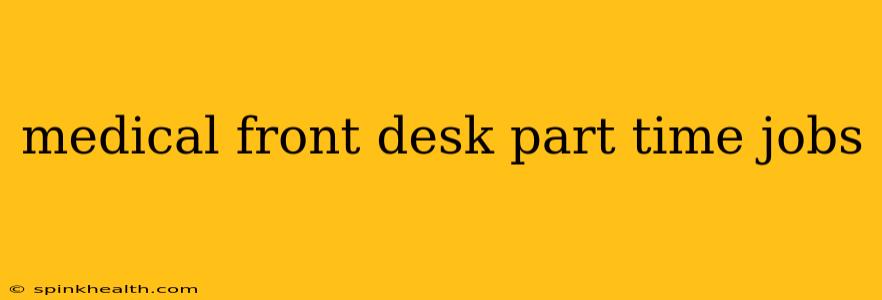Finding Your Perfect Fit: A Guide to Part-Time Medical Front Desk Jobs
The comforting hum of a busy medical office, the satisfying click of a keyboard, the feeling of helping people – this is the everyday reality for many medical front desk professionals. And if you're looking for a part-time position offering flexibility and rewarding work, a medical front desk role might be the perfect fit. But where do you even begin your search? Let's unravel the mysteries of finding your ideal part-time medical front desk job.
What are the typical responsibilities of a medical front desk receptionist?
This isn't just about answering phones, although that's a significant part of the job. A medical front desk receptionist is the first point of contact for patients, acting as a friendly and efficient gatekeeper to the medical practice. Responsibilities typically include scheduling appointments, managing patient records (often using electronic health records or EHR systems), handling insurance claims, processing payments, and answering patient inquiries with courtesy and professionalism. Think of it as the crucial hub connecting patients to the care they need.
What skills are essential for a medical front desk receptionist?
Beyond a friendly demeanor, several key skills are vital for success in this role. Strong communication skills are paramount, as you'll be interacting with a diverse range of people daily. Proficiency in computer software, especially EHR systems, is a must in most practices. Organizational skills are key for managing appointments, patient records, and paperwork efficiently. Multitasking abilities are essential, as juggling multiple tasks simultaneously is commonplace. Finally, medical terminology knowledge (even a basic understanding) can significantly enhance your effectiveness and efficiency.
What are the typical hours for a part-time medical front desk job?
The beauty of part-time work lies in its flexibility. Hours can vary significantly depending on the practice's needs and your availability. You might find positions offering mornings only, afternoons only, or a combination of days. Some clinics even offer weekend shifts, providing a wider range of options. Researching specific clinics and their advertised hours is the best way to find a schedule that aligns with your personal life.
How much can I expect to earn in a part-time medical front desk job?
The salary for a part-time medical front desk receptionist varies based on location, experience, and the size of the practice. Generally, part-time positions offer a pro-rated salary compared to full-time roles. Online job boards and salary websites can provide a better idea of the typical range for your area. Remember that experience and certifications can significantly impact your earning potential.
Where can I find part-time medical front desk job openings?
The search for your perfect position can begin in several places. Online job boards like Indeed, LinkedIn, and Glassdoor are excellent starting points. Don't overlook local clinic websites; many smaller practices post openings directly on their own sites. Networking within your community and reaching out to local medical professionals can also uncover hidden opportunities. Consider exploring staffing agencies specializing in healthcare recruitment; they often have access to part-time roles that aren't publicly advertised.
What certifications or experience might increase my chances of getting hired?
While not always mandatory, possessing certain certifications or experience can significantly enhance your application. A medical assistant certification (CMA or RMA) can demonstrate a higher level of knowledge and skill. Previous experience in a medical office, even in a non-front desk role, can show employers your familiarity with the medical environment. Highlighting any experience with relevant software like EHR systems (Epic, Cerner, etc.) is also a valuable asset.
Finding a part-time medical front desk job is a journey, but with the right approach and a dash of perseverance, you can discover a role that balances your career aspirations with your personal life. Remember to tailor your resume and cover letter to each specific position, showcasing the skills and experience most relevant to the job description. Good luck on your search – you've got this!

